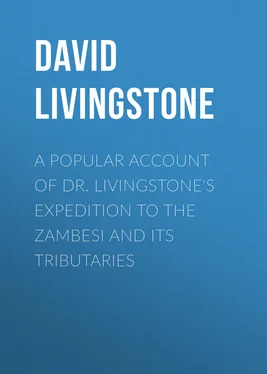David Livingstone - A Popular Account of Dr. Livingstone's Expedition to the Zambesi and Its Tributaries
Здесь есть возможность читать онлайн «David Livingstone - A Popular Account of Dr. Livingstone's Expedition to the Zambesi and Its Tributaries» — ознакомительный отрывок электронной книги совершенно бесплатно, а после прочтения отрывка купить полную версию. В некоторых случаях можно слушать аудио, скачать через торрент в формате fb2 и присутствует краткое содержание. Издательство: Иностранный паблик, Жанр: Путешествия и география, foreign_antique, foreign_prose, на английском языке. Описание произведения, (предисловие) а так же отзывы посетителей доступны на портале библиотеки ЛибКат.
- Название:A Popular Account of Dr. Livingstone's Expedition to the Zambesi and Its Tributaries
- Автор:
- Издательство:Иностранный паблик
- Жанр:
- Год:неизвестен
- ISBN:нет данных
- Рейтинг книги:4 / 5. Голосов: 1
-
Избранное:Добавить в избранное
- Отзывы:
-
Ваша оценка:
- 80
- 1
- 2
- 3
- 4
- 5
A Popular Account of Dr. Livingstone's Expedition to the Zambesi and Its Tributaries: краткое содержание, описание и аннотация
Предлагаем к чтению аннотацию, описание, краткое содержание или предисловие (зависит от того, что написал сам автор книги «A Popular Account of Dr. Livingstone's Expedition to the Zambesi and Its Tributaries»). Если вы не нашли необходимую информацию о книге — напишите в комментариях, мы постараемся отыскать её.
A Popular Account of Dr. Livingstone's Expedition to the Zambesi and Its Tributaries — читать онлайн ознакомительный отрывок
Ниже представлен текст книги, разбитый по страницам. Система сохранения места последней прочитанной страницы, позволяет с удобством читать онлайн бесплатно книгу «A Popular Account of Dr. Livingstone's Expedition to the Zambesi and Its Tributaries», без необходимости каждый раз заново искать на чём Вы остановились. Поставьте закладку, и сможете в любой момент перейти на страницу, на которой закончили чтение.
Интервал:
Закладка:
After a land-journey of forty days, we returned to the ship on the 6th of October, 1859, in a somewhat exhausted condition, arising more from a sort of poisoning, than from the usual fatigue of travel. We had taken a little mulligatawney paste, for making soup, in case of want of time to cook other food. Late one afternoon, at the end of an unusually long march, we reached Mikena, near the base of Mount Njongoné to the north of Zomba, and the cook was directed to use a couple of spoonfuls of the paste; but, instead of doing so, he put in the whole potful. The soup tasted rather hot, but we added boiled rice to it, and, being very hungry, partook freely of it; and, in consequence of the overdose, we were delayed several days in severe suffering, and some of the party did not recover till after our return to the ship. Our illness may partly have arisen from another cause. One kind of cassava ( Jatropha maligna ) is known to be, in its raw state, poisonous, but by boiling it carefully in two waters, which must be thrown off, the poison is extracted and the cassava rendered fit for food. The poisonous sort is easily known by raising a bit of the bark of the root, and putting the tongue to it. A bitter taste shows poison, but it is probable that even the sweet kind contains an injurious principle. The sap, which, like that of our potatoes, is injurious as an article of food, is used in the “Pepper-pot” of the West Indies, under the name of “Cassereep,” as a perfect preservative of meat. This juice put into an earthen vessel with a little water and Chili pepper is said to keep meat, that is immersed in it, good for a great length of time; even for years. No iron or steel must touch the mixture, or it will become sour. This “Pepper-pot,” of which we first heard from the late Archbishop Whately, is a most economical meat-safe in a hot climate; any beef, mutton, pork, or fowl that may be left at dinner, if put into the mixture and a little fresh cassereep added, keeps perfectly, though otherwise the heat of the climate or flies would spoil it. Our cook, however, boiled the cassava root as he was in the habit of cooking meat, namely, by filling the pot with it, and then pouring in water, which he allowed to stand on the fire until it had become absorbed and boiled away. This method did not expel the poisonous properties of the root, or render it wholesome; for, notwithstanding our systematic caution in purchasing only the harmless sort, we suffered daily from its effects, and it was only just before the end of our trip that this pernicious mode of boiling it was discovered by us.
In ascending 3000 feet from the lowlands to the highlands, or on reaching the low valley of the Shiré from the higher grounds, the change of climate was very marked. The heat was oppressive below, the thermometer standing at from 84 degrees to 103 degrees in the shade; and our spirits were as dull and languid as they had been exhilarated on the heights in a temperature cooler by some 20 degrees. The water of the river was sometimes 84 degrees or higher, whilst that we had been drinking in the hill streams was only 65 degrees.
It was found necessary to send two of our number across from the Shiré to Tette; and Dr. Kirk, with guides from Chibisa, and accompanied by Mr. Rae, the engineer, accomplished the journey. We had found the country to the north and east so very well watered, that no difficulty was anticipated in this respect in a march of less than a hundred miles; but on this occasion our friends suffered severely. The little water to be had at this time of the year, by digging in the beds of dry watercourses, was so brackish as to increase thirst—some of the natives indeed were making salt from it; and when at long intervals a less brackish supply was found, it was nauseous and muddy from the frequent visits of large game. The tsetse abounded. The country was level, and large tracts of it covered with mopane forest, the leaves of which afford but scanty shade to the baked earth, so that scarcely any grass grows upon it. The sun was so hot, that the men frequently jumped from the path, in the vain hope of cooling, for a moment, their scorched feet under the almost shadeless bushes; and the native who carried the provision of salt pork got lost, and came into Tette two days after the rest of the party, with nothing but the fibre of the meat left, the fat, melted by the blazing sun, having all run down his back. This path was soon made a highway for slaving parties by Captain Raposo, the Commandant. The journey nearly killed our two active young friends; and what the slaves must have since suffered on it no one can conceive; but slaving probably can never be conducted without enormous suffering and loss of life.
Mankokwé now sent a message to say that he wished us to stop at his village on our way down. He came on board on our arrival there with a handsome present, and said that his young people had dissuaded him from visiting us before; but now he was determined to see what every one else was seeing. A bald square-headed man, who had been his Prime Minister when we came up, was now out of office, and another old man, who had taken his place accompanied the chief. In passing the Elephant Marsh, we saw nine large herds of elephants; they sometimes formed a line two miles long.
On the 2nd of November we anchored off Shamoara, and sent the boat to Senna for biscuit and other provisions. Senhor Ferrão, with his wonted generosity, gave us a present of a bullock, which he sent to us in a canoe. Wishing to know if a second bullock would be acceptable to us, he consulted his Portuguese and English dictionary, and asked the sailor in charge if he would take another ; but Jack, mistaking the Portuguese pronunciation of the letter h, replied, “Oh no, sir, thank you, I don’t want an otter in the boat, they are such terrible biters!”
We had to ground the vessel on a shallow sandbank every night; she leaked so fast, that in deep water she would have sunk, and the pump had to be worked all day to keep her afloat. Heavy rains fell daily, producing the usual injurious effects in the cabin; and, unable to wait any longer for our associates, who had gone overland from the Shiré to Tette, we ran down the Kongoné and beached her for repairs. Her Majesty’s ship “Lynx,” Lieut. Berkeley commanding, called shortly afterwards with supplies; the bar, which had been perfectly smooth for some time before, became rather rough just before her arrival, so that it was two or three days before she could communicate with us. Two of her boats tried to come in on the second day, and one of them, mistaking the passage, capsized in the heavy breakers abreast of the island. Mr. Hunt, gunner, the officer in charge of the second boat, behaved nobly, and by his skilful and gallant conduct succeeded in rescuing every one of the first boat’s crew. Of course the things that they were bringing to us were lost, but we were thankful that all the men were saved. The loss of the mail-bags, containing Government despatches and our friends’ letters for the past year, was felt severely, as we were on the point of starting on an expedition into the interior, which might require eight or nine months; and twenty months is a weary time to be without news of friends and family. In the repairing of our crazy craft, we received kind and efficient aid from Lieutenant Berkeley, and we were enabled to leave for Tette on December 16th.
Конец ознакомительного фрагмента.
Текст предоставлен ООО «ЛитРес».
Прочитайте эту книгу целиком, на ЛитРес.
Безопасно оплатить книгу можно банковской картой Visa, MasterCard, Maestro, со счета мобильного телефона, с платежного терминала, в салоне МТС или Связной, через PayPal, WebMoney, Яндекс.Деньги, QIWI Кошелек, бонусными картами или другим удобным Вам способом.
Читать дальшеИнтервал:
Закладка:
Похожие книги на «A Popular Account of Dr. Livingstone's Expedition to the Zambesi and Its Tributaries»
Представляем Вашему вниманию похожие книги на «A Popular Account of Dr. Livingstone's Expedition to the Zambesi and Its Tributaries» списком для выбора. Мы отобрали схожую по названию и смыслу литературу в надежде предоставить читателям больше вариантов отыскать новые, интересные, ещё непрочитанные произведения.
Обсуждение, отзывы о книге «A Popular Account of Dr. Livingstone's Expedition to the Zambesi and Its Tributaries» и просто собственные мнения читателей. Оставьте ваши комментарии, напишите, что Вы думаете о произведении, его смысле или главных героях. Укажите что конкретно понравилось, а что нет, и почему Вы так считаете.












![Edward Ellis - Adrift on the Pacific - A Boys [sic] Story of the Sea and its Perils](/books/753342/edward-ellis-adrift-on-the-pacific-a-boys-sic-s-thumb.webp)